Skip to main content
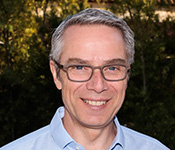 Allen School professor Dieter Fox will be honored at the 32nd International Joint Conference on Artificial Intelligence (IJCAI) with the 2023 John McCarthy Award. The award is named for the eponymous scientist, widely regarded as one of the founders of the field of artificial intelligence (AI), and recognizes established researchers who have built up a distinguished track record of research excellence in AI. Fox will receive his award this week and give a presentation on his work at the conference held in Macao, S.A.R. Read more →
Allen School professor Dieter Fox will be honored at the 32nd International Joint Conference on Artificial Intelligence (IJCAI) with the 2023 John McCarthy Award. The award is named for the eponymous scientist, widely regarded as one of the founders of the field of artificial intelligence (AI), and recognizes established researchers who have built up a distinguished track record of research excellence in AI. Fox will receive his award this week and give a presentation on his work at the conference held in Macao, S.A.R. Read more →
August 22, 2023
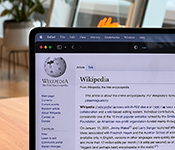 With nearly a billion unique monthly users, Wikipedia has become one of the most trusted sources of information worldwide. But while it’s considered more reliable than other internet sources, it’s not immune to bias. Last year, a team led by Allen School professor Yulia Tsvetkov developed a new methodology for studying bias in English Wikipedia biographies, and this spring won the 2023 Wikimedia Foundation Research Award of the Year for its efforts. The team first presented its findings at The Web Conference 2022. Read more →
With nearly a billion unique monthly users, Wikipedia has become one of the most trusted sources of information worldwide. But while it’s considered more reliable than other internet sources, it’s not immune to bias. Last year, a team led by Allen School professor Yulia Tsvetkov developed a new methodology for studying bias in English Wikipedia biographies, and this spring won the 2023 Wikimedia Foundation Research Award of the Year for its efforts. The team first presented its findings at The Web Conference 2022. Read more →
August 21, 2023
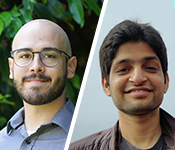 The Allen School’s Gabriel Ilharco and Ashish Sharma are among 13 students across the U.S. and England to receive 2023 J.P. Morgan AI Ph.D. Fellowships. The fellowships are part of the J.P. Morgan AI Research Awards Program, which advances artificial intelligence (AI) research to solve real-world problems. Read more →
The Allen School’s Gabriel Ilharco and Ashish Sharma are among 13 students across the U.S. and England to receive 2023 J.P. Morgan AI Ph.D. Fellowships. The fellowships are part of the J.P. Morgan AI Research Awards Program, which advances artificial intelligence (AI) research to solve real-world problems. Read more →
August 17, 2023
 Allen School researchers took home multiple Best Paper and Outstanding Paper Awards from the 61st Annual Meeting of the Association for Computational Linguistics (ACL) held in Toronto last month. Their research spanned a number of projects aimed at enhancing the performance and impact of natural language models, including how artificial intelligence (AI) processes humor, the impact of built-in political biases on model performance, AI-assisted cognitive reframing to support mental health, identifying “WEIRD” design biases in datasets and how to imbue language models with theory of mind capabilities. Read more →
Allen School researchers took home multiple Best Paper and Outstanding Paper Awards from the 61st Annual Meeting of the Association for Computational Linguistics (ACL) held in Toronto last month. Their research spanned a number of projects aimed at enhancing the performance and impact of natural language models, including how artificial intelligence (AI) processes humor, the impact of built-in political biases on model performance, AI-assisted cognitive reframing to support mental health, identifying “WEIRD” design biases in datasets and how to imbue language models with theory of mind capabilities. Read more →
August 15, 2023
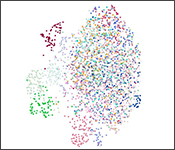 In the days before single-cell RNA sequencing, researchers investigating the mechanisms and treatment of disease had to make do with running experiments on bulk cell profiles created by taking tissue samples and grinding them up. Nowadays, researchers can take measurements at the level of individual cells, enabling the exploration of such finer-grained distinctions and advancing our understanding of various biological functions. But without the right computational tools, even single-cell datasets can yield distinctions without a difference. In a paper published this week in Nature Methods, a team in the Allen School’s AIMS Lab led by professor Su-In Lee introduced ContrastiveVI, the first deep learning model designed for applying a powerful technique called contrastive analysis to single-cell data. Read more →
In the days before single-cell RNA sequencing, researchers investigating the mechanisms and treatment of disease had to make do with running experiments on bulk cell profiles created by taking tissue samples and grinding them up. Nowadays, researchers can take measurements at the level of individual cells, enabling the exploration of such finer-grained distinctions and advancing our understanding of various biological functions. But without the right computational tools, even single-cell datasets can yield distinctions without a difference. In a paper published this week in Nature Methods, a team in the Allen School’s AIMS Lab led by professor Su-In Lee introduced ContrastiveVI, the first deep learning model designed for applying a powerful technique called contrastive analysis to single-cell data. Read more →
August 9, 2023
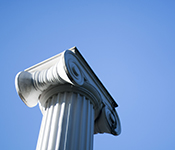 A chance encounter helped Paul Beame, Paris Koutris (Ph.D., ‘15) and Dan Suciu create a model that aids scientists in understanding some of the deeper nuances surrounding big data management. Their paper "Communication Steps for Parallel Query Processing" earned the 2023 ACM PODS Alberto O. Mendelzon Test-of-Time Award for providing a deeper understanding of the complexity behind database query evaluation. Read more →
A chance encounter helped Paul Beame, Paris Koutris (Ph.D., ‘15) and Dan Suciu create a model that aids scientists in understanding some of the deeper nuances surrounding big data management. Their paper "Communication Steps for Parallel Query Processing" earned the 2023 ACM PODS Alberto O. Mendelzon Test-of-Time Award for providing a deeper understanding of the complexity behind database query evaluation. Read more →
July 20, 2023
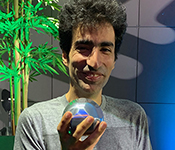 Shayan Oveis Gharan, a professor in the Allen School’s Theory of Computation group, combines all the essential ingredients of a trailblazing researcher who, as his colleagues will attest, also happens to be a genuinely nice guy. The combination has proved to be a genuine recipe for success, as he has racked up a series of accolades in theoretical computer science. His most recent honor, the Stephen Smale Prize from the Society for the Foundations of Computational Mathematics (FoCM), celebrated Oveis Gharan’s “breakthrough results on the applications of algebraic and spectral methods to the design of algorithms and to combinatorial optimization.” Read more →
Shayan Oveis Gharan, a professor in the Allen School’s Theory of Computation group, combines all the essential ingredients of a trailblazing researcher who, as his colleagues will attest, also happens to be a genuinely nice guy. The combination has proved to be a genuine recipe for success, as he has racked up a series of accolades in theoretical computer science. His most recent honor, the Stephen Smale Prize from the Society for the Foundations of Computational Mathematics (FoCM), celebrated Oveis Gharan’s “breakthrough results on the applications of algebraic and spectral methods to the design of algorithms and to combinatorial optimization.” Read more →
July 18, 2023
 There is an old saying that perception is everything, and with regard to human senses and computer models that attempt to demonstrate how human sensory systems work, everything is highly complex. This includes our system of visual perception, which allows humans to interact with the dynamic world in real time. Allen School Ph.D. student Linxing Preston Jiang and professor Rajesh Rao have developed a computational model to simulate how humans process visual information. Their paper, “Dynamic Predictive Coding Explains Both Prediction and Postdiction in Visual Motion Perception,” earned a Best Paper Award in the Perception and Action category at this year’s COGSCI conference. Read more →
There is an old saying that perception is everything, and with regard to human senses and computer models that attempt to demonstrate how human sensory systems work, everything is highly complex. This includes our system of visual perception, which allows humans to interact with the dynamic world in real time. Allen School Ph.D. student Linxing Preston Jiang and professor Rajesh Rao have developed a computational model to simulate how humans process visual information. Their paper, “Dynamic Predictive Coding Explains Both Prediction and Postdiction in Visual Motion Perception,” earned a Best Paper Award in the Perception and Action category at this year’s COGSCI conference. Read more →
July 13, 2023
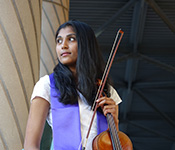 The possibility of a greener future inspired Meghna Shankar to study alternative energy and help wean society off of fossil fuels. The recent Allen School alum, who also spent four years as part of the UW Symphony Orchestra, was named a 2023 Dean's Medalist in the Natural Sciences by the College of Arts & Sciences in recognition of her many scholastic achievements. Read more →
The possibility of a greener future inspired Meghna Shankar to study alternative energy and help wean society off of fossil fuels. The recent Allen School alum, who also spent four years as part of the UW Symphony Orchestra, was named a 2023 Dean's Medalist in the Natural Sciences by the College of Arts & Sciences in recognition of her many scholastic achievements. Read more →
July 11, 2023
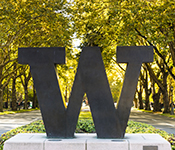 For faculty members who are at the start of their research journey, the National Science Foundation’s CAREER Awards are one of the most prestigious honors recognizing early-career scholarship and supporting future leaders in their respective fields. The latest Allen School recipients are no exception. From using machine learning to fight implicit bias to devising new architectures that bridge electronics and biology, here are eight rising stars who are advancing the field of computing at the University of Washington and reaching new heights. Read more →
For faculty members who are at the start of their research journey, the National Science Foundation’s CAREER Awards are one of the most prestigious honors recognizing early-career scholarship and supporting future leaders in their respective fields. The latest Allen School recipients are no exception. From using machine learning to fight implicit bias to devising new architectures that bridge electronics and biology, here are eight rising stars who are advancing the field of computing at the University of Washington and reaching new heights. Read more →
June 30, 2023
« Newer Posts — Older Posts »
 Allen School professor Dieter Fox will be honored at the 32nd International Joint Conference on Artificial Intelligence (IJCAI) with the 2023 John McCarthy Award. The award is named for the eponymous scientist, widely regarded as one of the founders of the field of artificial intelligence (AI), and recognizes established researchers who have built up a distinguished track record of research excellence in AI. Fox will receive his award this week and give a presentation on his work at the conference held in Macao, S.A.R. Read more →
Allen School professor Dieter Fox will be honored at the 32nd International Joint Conference on Artificial Intelligence (IJCAI) with the 2023 John McCarthy Award. The award is named for the eponymous scientist, widely regarded as one of the founders of the field of artificial intelligence (AI), and recognizes established researchers who have built up a distinguished track record of research excellence in AI. Fox will receive his award this week and give a presentation on his work at the conference held in Macao, S.A.R. Read more →

 Allen School professor Dieter Fox will be honored at the 32nd International Joint Conference on Artificial Intelligence (IJCAI) with the 2023 John McCarthy Award. The award is named for the eponymous scientist, widely regarded as one of the founders of the field of artificial intelligence (AI), and recognizes established researchers who have built up a distinguished track record of research excellence in AI. Fox will receive his award this week and give a presentation on his work at the conference held in Macao, S.A.R. Read more →
Allen School professor Dieter Fox will be honored at the 32nd International Joint Conference on Artificial Intelligence (IJCAI) with the 2023 John McCarthy Award. The award is named for the eponymous scientist, widely regarded as one of the founders of the field of artificial intelligence (AI), and recognizes established researchers who have built up a distinguished track record of research excellence in AI. Fox will receive his award this week and give a presentation on his work at the conference held in Macao, S.A.R. Read more →
 With nearly a billion unique monthly users, Wikipedia has become one of the most trusted sources of information worldwide. But while it’s considered more reliable than other internet sources, it’s not immune to bias. Last year, a team led by Allen School professor Yulia Tsvetkov developed a new methodology for studying bias in English Wikipedia biographies, and this spring won the 2023 Wikimedia Foundation Research Award of the Year for its efforts. The team first presented its findings at The Web Conference 2022. Read more →
With nearly a billion unique monthly users, Wikipedia has become one of the most trusted sources of information worldwide. But while it’s considered more reliable than other internet sources, it’s not immune to bias. Last year, a team led by Allen School professor Yulia Tsvetkov developed a new methodology for studying bias in English Wikipedia biographies, and this spring won the 2023 Wikimedia Foundation Research Award of the Year for its efforts. The team first presented its findings at The Web Conference 2022. Read more →
 The Allen School’s Gabriel Ilharco and Ashish Sharma are among 13 students across the U.S. and England to receive 2023 J.P. Morgan AI Ph.D. Fellowships. The fellowships are part of the J.P. Morgan AI Research Awards Program, which advances artificial intelligence (AI) research to solve real-world problems. Read more →
The Allen School’s Gabriel Ilharco and Ashish Sharma are among 13 students across the U.S. and England to receive 2023 J.P. Morgan AI Ph.D. Fellowships. The fellowships are part of the J.P. Morgan AI Research Awards Program, which advances artificial intelligence (AI) research to solve real-world problems. Read more →
 Allen School researchers took home multiple Best Paper and Outstanding Paper Awards from the 61st Annual Meeting of the Association for Computational Linguistics (ACL) held in Toronto last month. Their research spanned a number of projects aimed at enhancing the performance and impact of natural language models, including how artificial intelligence (AI) processes humor, the impact of built-in political biases on model performance, AI-assisted cognitive reframing to support mental health, identifying “WEIRD” design biases in datasets and how to imbue language models with theory of mind capabilities. Read more →
Allen School researchers took home multiple Best Paper and Outstanding Paper Awards from the 61st Annual Meeting of the Association for Computational Linguistics (ACL) held in Toronto last month. Their research spanned a number of projects aimed at enhancing the performance and impact of natural language models, including how artificial intelligence (AI) processes humor, the impact of built-in political biases on model performance, AI-assisted cognitive reframing to support mental health, identifying “WEIRD” design biases in datasets and how to imbue language models with theory of mind capabilities. Read more →
 In the days before single-cell RNA sequencing, researchers investigating the mechanisms and treatment of disease had to make do with running experiments on bulk cell profiles created by taking tissue samples and grinding them up. Nowadays, researchers can take measurements at the level of individual cells, enabling the exploration of such finer-grained distinctions and advancing our understanding of various biological functions. But without the right computational tools, even single-cell datasets can yield distinctions without a difference. In a paper published this week in Nature Methods, a team in the Allen School’s AIMS Lab led by professor Su-In Lee introduced ContrastiveVI, the first deep learning model designed for applying a powerful technique called contrastive analysis to single-cell data. Read more →
In the days before single-cell RNA sequencing, researchers investigating the mechanisms and treatment of disease had to make do with running experiments on bulk cell profiles created by taking tissue samples and grinding them up. Nowadays, researchers can take measurements at the level of individual cells, enabling the exploration of such finer-grained distinctions and advancing our understanding of various biological functions. But without the right computational tools, even single-cell datasets can yield distinctions without a difference. In a paper published this week in Nature Methods, a team in the Allen School’s AIMS Lab led by professor Su-In Lee introduced ContrastiveVI, the first deep learning model designed for applying a powerful technique called contrastive analysis to single-cell data. Read more →
 A chance encounter helped Paul Beame, Paris Koutris (Ph.D., ‘15) and Dan Suciu create a model that aids scientists in understanding some of the deeper nuances surrounding big data management. Their paper "Communication Steps for Parallel Query Processing" earned the 2023 ACM PODS Alberto O. Mendelzon Test-of-Time Award for providing a deeper understanding of the complexity behind database query evaluation. Read more →
A chance encounter helped Paul Beame, Paris Koutris (Ph.D., ‘15) and Dan Suciu create a model that aids scientists in understanding some of the deeper nuances surrounding big data management. Their paper "Communication Steps for Parallel Query Processing" earned the 2023 ACM PODS Alberto O. Mendelzon Test-of-Time Award for providing a deeper understanding of the complexity behind database query evaluation. Read more →
 Shayan Oveis Gharan, a professor in the Allen School’s Theory of Computation group, combines all the essential ingredients of a trailblazing researcher who, as his colleagues will attest, also happens to be a genuinely nice guy. The combination has proved to be a genuine recipe for success, as he has racked up a series of accolades in theoretical computer science. His most recent honor, the Stephen Smale Prize from the Society for the Foundations of Computational Mathematics (FoCM), celebrated Oveis Gharan’s “breakthrough results on the applications of algebraic and spectral methods to the design of algorithms and to combinatorial optimization.” Read more →
Shayan Oveis Gharan, a professor in the Allen School’s Theory of Computation group, combines all the essential ingredients of a trailblazing researcher who, as his colleagues will attest, also happens to be a genuinely nice guy. The combination has proved to be a genuine recipe for success, as he has racked up a series of accolades in theoretical computer science. His most recent honor, the Stephen Smale Prize from the Society for the Foundations of Computational Mathematics (FoCM), celebrated Oveis Gharan’s “breakthrough results on the applications of algebraic and spectral methods to the design of algorithms and to combinatorial optimization.” Read more →
 There is an old saying that perception is everything, and with regard to human senses and computer models that attempt to demonstrate how human sensory systems work, everything is highly complex. This includes our system of visual perception, which allows humans to interact with the dynamic world in real time. Allen School Ph.D. student Linxing Preston Jiang and professor Rajesh Rao have developed a computational model to simulate how humans process visual information. Their paper, “Dynamic Predictive Coding Explains Both Prediction and Postdiction in Visual Motion Perception,” earned a Best Paper Award in the Perception and Action category at this year’s COGSCI conference. Read more →
There is an old saying that perception is everything, and with regard to human senses and computer models that attempt to demonstrate how human sensory systems work, everything is highly complex. This includes our system of visual perception, which allows humans to interact with the dynamic world in real time. Allen School Ph.D. student Linxing Preston Jiang and professor Rajesh Rao have developed a computational model to simulate how humans process visual information. Their paper, “Dynamic Predictive Coding Explains Both Prediction and Postdiction in Visual Motion Perception,” earned a Best Paper Award in the Perception and Action category at this year’s COGSCI conference. Read more →
 The possibility of a greener future inspired Meghna Shankar to study alternative energy and help wean society off of fossil fuels. The recent Allen School alum, who also spent four years as part of the UW Symphony Orchestra, was named a 2023 Dean's Medalist in the Natural Sciences by the College of Arts & Sciences in recognition of her many scholastic achievements. Read more →
The possibility of a greener future inspired Meghna Shankar to study alternative energy and help wean society off of fossil fuels. The recent Allen School alum, who also spent four years as part of the UW Symphony Orchestra, was named a 2023 Dean's Medalist in the Natural Sciences by the College of Arts & Sciences in recognition of her many scholastic achievements. Read more →
 For faculty members who are at the start of their research journey, the National Science Foundation’s CAREER Awards are one of the most prestigious honors recognizing early-career scholarship and supporting future leaders in their respective fields. The latest Allen School recipients are no exception. From using machine learning to fight implicit bias to devising new architectures that bridge electronics and biology, here are eight rising stars who are advancing the field of computing at the University of Washington and reaching new heights. Read more →
For faculty members who are at the start of their research journey, the National Science Foundation’s CAREER Awards are one of the most prestigious honors recognizing early-career scholarship and supporting future leaders in their respective fields. The latest Allen School recipients are no exception. From using machine learning to fight implicit bias to devising new architectures that bridge electronics and biology, here are eight rising stars who are advancing the field of computing at the University of Washington and reaching new heights. Read more →
